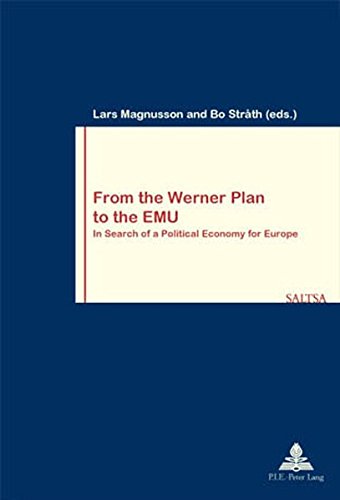In Search of a Political Economy for Europe

Lars Magnusson, Bo Stråth (eds.), From the Werner Plan to the EMU, In Search of a Political Economy for Europe. Work and Society No. 29. P.I.E.-Peter Lang, Brussels 2001
Abstract
The aim of this book is to explore the preconditions of a European political economy. The establishment of the monetary union and the European Central Bank constitutes a major step towards greater economic, social and political integration between member states of the European Union. It represents a momentous step in European history. What did the historically given preconditions of a European political economy mean, in practice and theory, regarding future possibilities? Future prospects of EMU are addressed here from a historical perspective on European monetary integration, from the strains in the Dollar-based Bretton Woods order in the 1960s and earlier, the Wener Plan around 1970, and the international market in the 1980s to the Maastricht Treaty in 1992.
The book is based on the reflections of a working group at the European University Institute in Florence between 1999 and 2001. The fifteen chapters are organised in clusters on the historical and conceptual setting, on financial institutions and economic theory, on social practices and legal framework and future prospects.
Contributors: D. Ashiagbor, J. P. Burgess, J. de Beus, S. C. Dow, R. Hammersland, U. Liebert, B. MacLennan, L. Magnusson, T. Notermans, J. Ottosson, D. Purdy, O. B. Røste, R. Salais, B. Stråth, A. Verdun and H. Zimmermann.
Contents
Preface
Abbreviations
From the Werner Plan to the EMU: A Chronology
Introduction. From the Werner Plan to the EMU: In Search of a European Political Economy. Historical Perspectives and Future Prospects. Lars Magnusson and Bo Stråth
Part I. The Historical and Conceptual Setting
Chapter 1. The Fall of Bretton Woods and the Emergence of the Werner Plan. Hubert Zimmermann
Chapter 2. The Political Economy of the Werner and Delors Reports: Continuity amidst Change or Change amidst Continuity? Amu Verdun
Chapter 3, Economic Theory and Policy from the Keynesian Revolution to the Third Way. David Purdy
Chapter 4. Money and Political Economy: From the Werner Plan to the Delors Report and Beyond. J Peter Burgess and Bo Stråth
Chapter 5. The Political Transaction Costs of the Convergence Criteria: The EMU Compromise for the Delors Committee to Maastricht. Lars Magnusson and Jan Ottosson
Part II. Financial Institutions and Economic Theory
Chapter 6. The ECB, Banking, Monetary Policy and Unemployment. Sheila C Dow
Chapter 7. “We are arrogant because we are good.” A Critical Appraisal of Central Banking versus Fiscal Policy in Accomplishing the Community Wide Convergence in the 1980s and 1990s. Roger Hammersland
Chapter 8. Labour Markets and the EMU: The Cases of Norway and Sweden. Ole Bjøn Røste
Part III. Social Practices and Legal Framework
Chapter 9. Finance, Gender and Structural Change in the European Union. Barbara MacLennan
Chapter10. Constructing EMU: Euro-Scepticism and the Emerging European Public Sphere. Ulrike Liebert
Chapter 11. EMU and the Shift from a “Social Policy” Agenda to an “Employment Policy” Agenda in European Labour Law. Diamond Ashiagbor
Part IV. Future Prospects
Chapter 12. The Werner Plan as a Blueprint for EMU? Ton Notermans
Chapter 13. Are Third-Way Social Democrats Friends or Enemies of European Integration? A Tocquevillian Tale on the Politics of Administration. Jos de Beus
Chapter 14. Welfare Reform, Social Citizenship and European Integration. David Purdy
Chapter 15. Filling the Gap between Macroeconomic Policy and Situated Approaches to Employment. A Hidden Agenda for Europe? Robert Salais
Postscript. Lars Magnusson and Bo Stråth
Bibliography
Notes on Contributors
Index




































